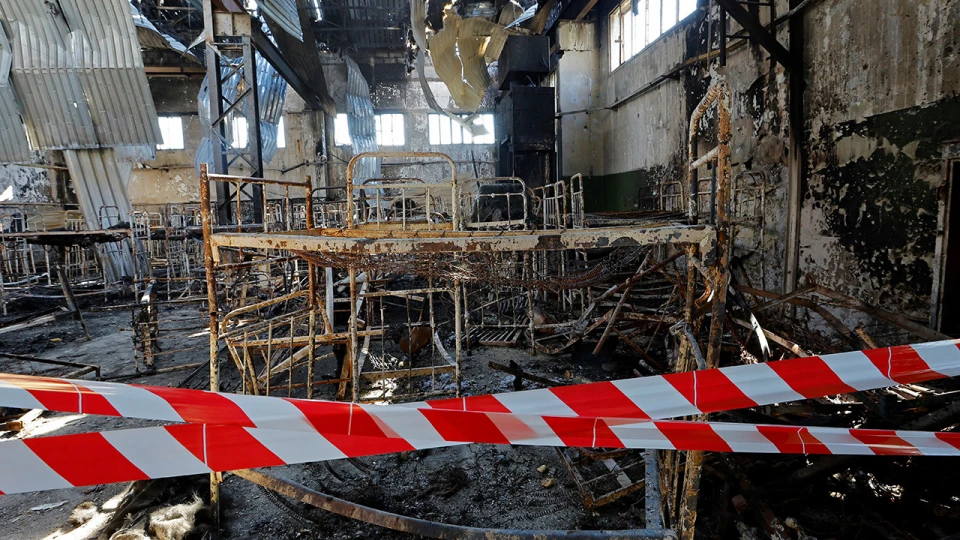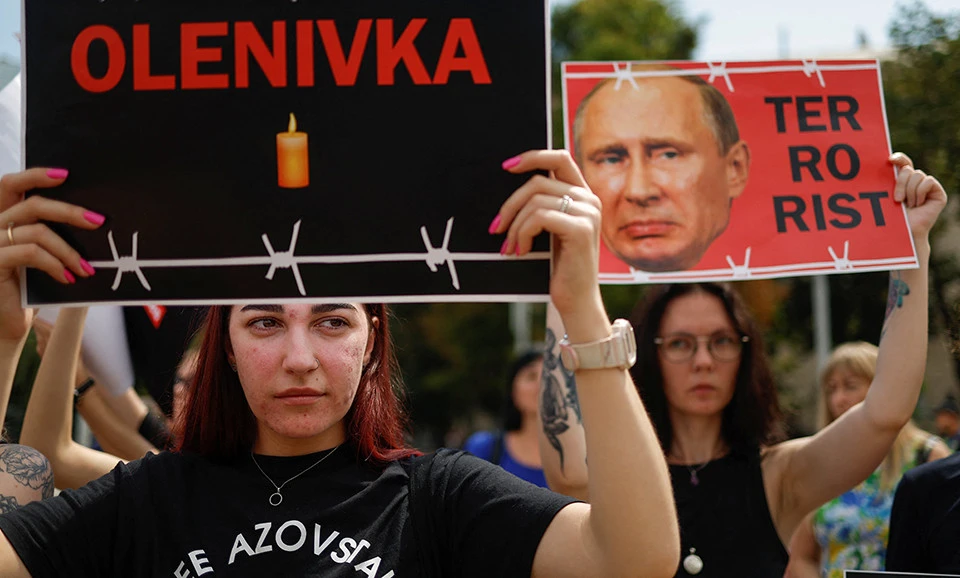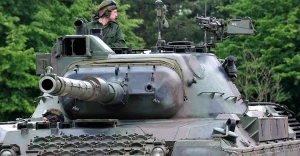
International community benefits from turning blind eye to Russia's torture of Ukrainians for years - Olenivka Families Community activist
The full-scale war has posed new challenges for Ukrainians. The totalitarian Russian regime has expanded the scope of massive and brutal crimes and is now executing Ukrainians by the hundreds, committing bloody terrorist acts
One of them was an act of genocide in the Olenivka colony on the temporarily occupied territory of Donetsk region. There, Ukrainian prisoners of war were burned alive, and the Russians did not even provide them with first aid.
Has Ukraine and the international community learned how to counter Russian aggressors, what are the mechanisms of protection and do they exist at all? Espreso talked to Oleksandra Mazur, a representative of the Olenivka Families Community, about these issues. Her loved one was killed in a barracks in the Olenivka colony, and she began to engage in public activities related to the massacre.
A planned mass execution took place in Olenivka

Photo: Reuters
The Russians staged a terrorist attack in the Olenivka prison barracks on the night of July 29, 2022. A powerful explosion occurred in the building where Ukrainian prisoners of war were held. As of October, the information about the attack in Olenivka was as follows: 193 people were in the barracks at the time of the explosion, according to the Russians. There were also DNA analyses of 52 dead and 11 people returned to Ukraine. In January, at a briefing, it was said that 23 people had been returned.
Oleksandra Mazur emphasizes that she cannot give specific figures because the data is constantly changing and the investigation is ongoing. The information is being clarified and verified. Neither civic activists nor relatives of the men who were in the barracks have access to confidential information.
"We are not informed about the investigation. We can only talk about the dead, those about whom we have confirmed information, and only if the families agree. Because we also need to understand that not all families accept the fact of death. Even if there is confirmation from DNA tests. Therefore, when we take the responsibility to say that this person is dead, there is a difficult ethical moment in relation to the family who do not believe in the death," says Oleksandra.
The fate of more than a hundred people from the barracks where the explosion occurred remains unknown. There is no contact with them, and the only information is available from those who have been released from captivity.
"Sometimes POWs who have returned say they have seen several people from that barrack. But they just saw them - there are no details about their physical or moral condition. Those returning from captivity simply say that they saw a person, say, a month before they returned. That is, as of that month, the person was alive. Therefore, there is hope and we know about such people now. But there are not many of them. For example, if there are still more than a hundred people in captivity, then there was information about a few dozen who were seen during this time," says Mazur.
The activist also does not have access to the testimonies of Olenivka prisoners who return from captivity, only when they are published for public access. Oleksandra believes that this is right - it is very important to maintain confidentiality here.
"From what is known from the publicly disseminated information, we can confidently say that there is a planned execution in Olenivka. The Russians came and took people from other barracks to the barrack where the terrorist attack took place before July 28 according to a list. These people, not others," the activist emphasizes.
Ukraine was returning collaborators from captivity, and the special services did not pay attention to this
Two years ago, when the full-scale Russian invasion began, Oleksandra, a philologist, had no idea that she would soon have to meet with officials, speak at the UN, or support the families of prisoners of war. She says she hoped that there would be no full-scale war.
"But the war has been going on since 2014. The Russian army was already on the territory of Ukraine, and it was clear that they were testing our reaction and the reaction of the international community. The Russians have been training and learning how to interact with our army in order to win. That is, all these years have been training for a full-scale war - the accumulation of knowledge, information and forces on the part of Russia," says Oleksandra Mazur.
However, according to the activist, the achievements of Ukrainians by 2022, for example, in terms of releasing captives, were insignificant. Thus, some people are still in captivity from before the full-scale invasion.
"Over the past years, I have often seen information that people who helped the Russians torture other prisoners were taken from captivity. For example, political prisoner Stanislav Aseyev told me how people who had collaborated with the Russians were returning to Ukraine. Our services already had this information, but they either did not take it into account or did not want to. Now, during the full-scale war, I have not seen such information, so maybe something has changed. But the mechanism was definitely not worked out then, because, firstly, not everyone was returned in all the years before the full-scale invasion, and when returning some, they did not take into account the alarming reports of other former captives," explains the representative of the Olenivka Families Community.
Mazur advises people who do not know where their loved ones are today to call the National Information Bureau, which will provide an algorithm of actions. But, Oleksandra admits, the state often has no information about missing people.

"Then, it happens that relatives are "hooked" by Russian information manipulations. They start searching through their resources, telegram channels. These telegram channels exist for a reason, posting photos and videos. They transmit certain messages to undermine the situation inside our country. This is to sow despondency in people and to infect them with internal conflict," explains Mazur.
She says that Ukrainians need to work out these resources, take filtered information from there and give it to their relatives so that they do not become victims of manipulations on Russian resources.
Russians have always been so cruel, it's just that they used to torture each other in Russia
Oleksandra Mazur does not believe that the Russians have begun to show more cruelty at the large-scale stage of the war than before. Probably, the behavior of the aggressors has not been discussed so much in the world. In particular, the activist recalls a book by Shevchenko Prize winner Stanislav Aseyev, The Bright Path: The Story of a Concentration Camp, which Oleksandra received shortly before the full-scale invasion. This book describes the torture of captives by the Russians.
"Were they trying to save face or some international image? I don't think so. Especially since there is a lot of information about Russians torturing their own people. They torture each other in the same way in their own country, in their prisons, and there are very high-profile cases. But if we talk about the reaction of the international community, my subjective opinion is that it was simply financially beneficial not to conflict with Russia. I think it's just that most countries today do not believe that Russia can attack them. Even countries like our neighboring Poland or the Baltic states. They are members of NATO and believe that the Alliance will protect them, they often say so. But different things can happen, not necessarily that it will. However, the people of these countries believe that there is no need to worry too much," says Mazur.
According to Oleksandra, economically developed countries, their authorities and activists, knew about the torture and abuse of Ukrainians by Russians in the Russian Federation and in the occupied territories but did nothing because it was economically unprofitable for them
"We can also recall how people are tortured in Chechnya. There was information that there are basements for LGBT people there, where they are "re-educated" by torture. For some reason, I have not seen a strong reaction to this from the world's influential LGBT communities. That is, Russia is, in fact, such a country, a "Gulag". And no one saves those people who are there alone among victims and torturers," the social activist summarized.
- News













































